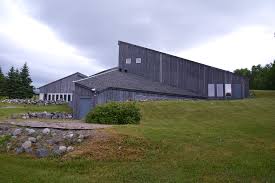By Ken Kellar
Local Journalism Initiative Reporter
Kay-Nah-Chi-Wah-Nung Historical Centre in Rainy River First Nations is celebrating a big win at the provincial level.
During a virtual award ceremony held on October 28 by the Tourism Industry Association of Ontario (TIAO) for their annual Ontario Tourism Awards of Excellence, the historical centre was revealed to be the winner of the 2020 Indigenous Tourism Award, which the centre’s curator and administration manager Kayleigh Speirs said means a lot to the organization, especially considering the landscape in 2020.
“It’s really awesome to win this award, especially in such a weird year, as this one is,” Speirs said.
“It’s been such a struggle for museums and everybody in the tourism industry, so it’s been really nice to be recognized.”
The historical centre, also known as Manitou Mounds or “the Place of the Long Rapids,” is located roughly 60 km west of Fort Frances and 65km north of the headwaters of the Mississippi River.
According to their website, the location is “one of the most significant centres of early habitation and ceremonial burial in Canada,” recording more than 8,000 years of recurring use or habitation. As part of their offerings, the historical centre features a museum, restaurant, roundhouse, nature trails and more to help connect visitors with the history of the Indigenous peoples who have lived in the area, as well as the history and impacts of Treaty 3.
This long history secured the area a Natural Historic Site of Canada designation in 1969, and contributed to the award win in 2020.
“This award specifically goes towards either an organization or an experience or an individual that demonstrates commitment to the development and promotion of authentic cultural indigenous experiences for visitors within Ontario,” Speirs said.
“It means quite a lot. We know how much of a special place this is, but it is really nice and exciting and validating to get recognized like this, to realize all of our hard work, all of our team and communities’ hard work is really paying off as well.”
The award comes in the midst of a pandemic that has caused countless problems for tourism operations of all kinds in northwestern Ontario, hitting fly-in fishing camps, museums, roadside attractions and more in different but no less severe ways.
Kay-Nah-Chi-Wah-Nung is no exception to the pains felt during COVID-19, having lost their summer season to gathering restrictions and government mandated shutdowns. Even now, Speirs said, visitor programs at the centre are only just beginning to return in a modified capacity
“It’s been a very strange year,” she explained.
“We’ve been closed for the most part to the public since March and we still haven’t fully reopened. We just started taking some groups, but of course right now with restrictions and stuff we’re only able to take up to a maximum of ten. The nice thing about being closed is we’ve just been able to work on a lot of stuff behind the scenes, so we’ve focussed on grant applications and things like that.”
According to Speirs, the centre has been able to access more than $70,000 in stimulus funding that she said they’ve been able to put towards things like staff wages and other operational costs, offsetting some of the damage felt from lost revenue, but she’s also hoping that as things begin to slowly pick back up, the award will help to draw in new visitors and opportunities.
“I think in a lot of ways it’s still just business as usual, kind of carrying on as we would,” she said. “But I think in a lot of ways winning this award has put us more on the map and in that way it’s definitely opened up more opportunities for potentially the creation of more partnerships and whatnot. We’ll continue as we always do according to our mandate, but yeah, definitely we’re aware that it could open new doors for experiences.”
Speirs noted she’s hopeful the restaurant will be able to open in the near future “in some capacity,” and the centre is also expecting to offer its winter programming, as a number of the activities on offer, like skiing and snowshoeing, are outdoors and able to be socially distanced.
But Speirs said she’s also excited that there could be a knock-on effect of the award win as more people learn about the historical centre and, potentially, the lands and communities that surround it.
“Something that I think is really exciting for this area is that a lot of people wouldn’t necessarily consider Northwestern Ontario as a tourism kind of destination,” she said.
“But I’m hoping that something like this, it’s bringing attention to our Center but it can also bring attention to really this whole area. Maybe people will kind of look into, ‘All right, what else is going on out there?’ and kind of realize some of the other fantastic opportunities there are in this part of the country.”
Ken Kellar is a Local Journalism Initiative reporter who works out of the Fort Francis Times. The Local Journalism Initiative is funded by the Government of Canada.
 Aboriginal Business Magazine Your source for Aboriginal Business News
Aboriginal Business Magazine Your source for Aboriginal Business News



